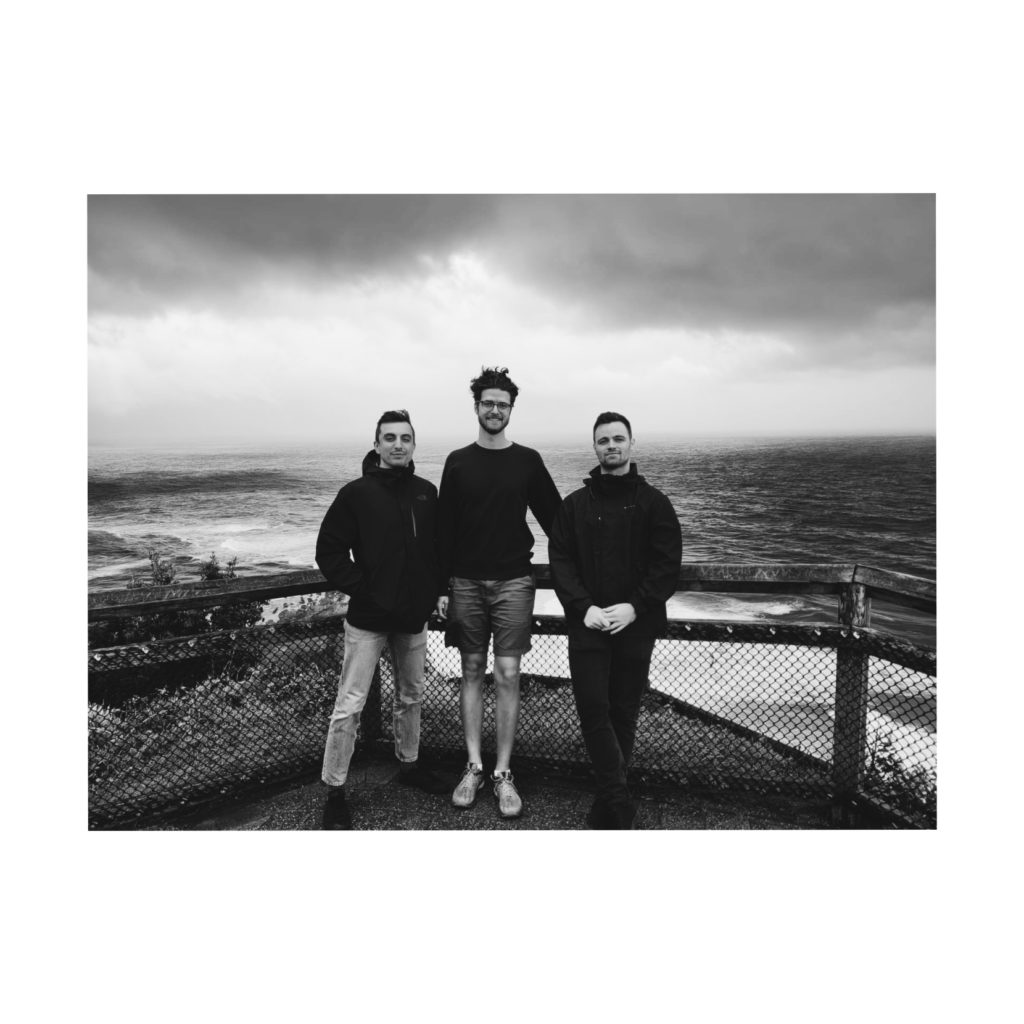
Buddhism is Kinda Out There, Man (2021) is a video essay by youtuber exurb1a.

Buddhism is Kinda Out There, Man (2021) is a video essay by youtuber exurb1a.
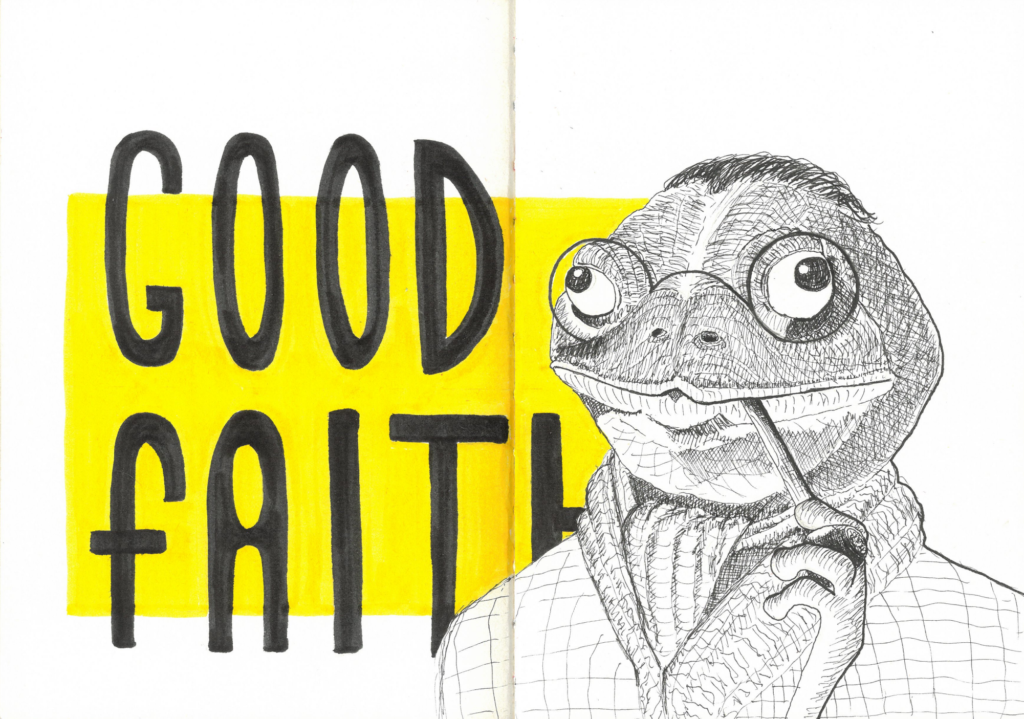
Jean-Paul Sartre born 1905, was a French philosopher and political activist best known for his work Being and Nothingness (1943). Sartre would become a leading figure of 20th Century philosophy (particularly Existentialism) and Marxism. A key theme of Sartre’s works would explore the tension between conformity for the sake of survival in society and the responsibility of the individual to transcend this in order to live authentically.
Sartre is considered one of the founding figures of Existentialism. This philosophy explored themes related to individual existence, freedom, choice, responsibility and the inherent challenges of human life.
In Being and Nothingness Sartre introduces us to the concept of ‘Bad Faith’ and its natural counterpart ‘Good Faith’. Bad faith refers to a state in which individuals deceive themselves about their own freedom and evade their responsibility for the choices they make. It involves denying one’s own agency and allowing external factors or societal norms to dictate one’s action and identity.
In bad faith, individuals act as if they are not truly free to make choices, even though they are. They adopt roles and behaviors that align with societal expectations, thereby avoiding the anxiety and responsibility that comes with authentic self-determination.
For example we can imagine a young person who has a deep passion for art but is under pressure from their family to pursue a more stable and lucrative career, such as becoming a doctor. Despite their true desire to be an artist, they decide to study medicine because they feel obliged to meet their family’s expectations and conform to societal norms. They convince themselves that becoming a doctor is their ‘true calling’ or that they find some kind of artistic expression within the medical field.
In this scenario, the individual is engaging in bad faith. They are denying their own freedom to choose the path that aligns with their genuine passion and identity. Instead they are allowing external influences to determine their life choices. They may experience a sense of inner conflict and dissatisfaction, as their actions are not in line with their authentic self.
Sartre calls us to instead live in ‘Good Faith’ where we recognise our capacity for free choice and to take responsibility for our decisions, even in the face of societal pressures and existential anxiety. He urges individuals to confront the discomfort of their own freedom and embrace the challenge of living authentically, rather than adopting roles that mask their true desires and potential.
You can watch a great short video essay on Sartre here.
“Life begins on the other side of despair” – Jean-Paul Sartre
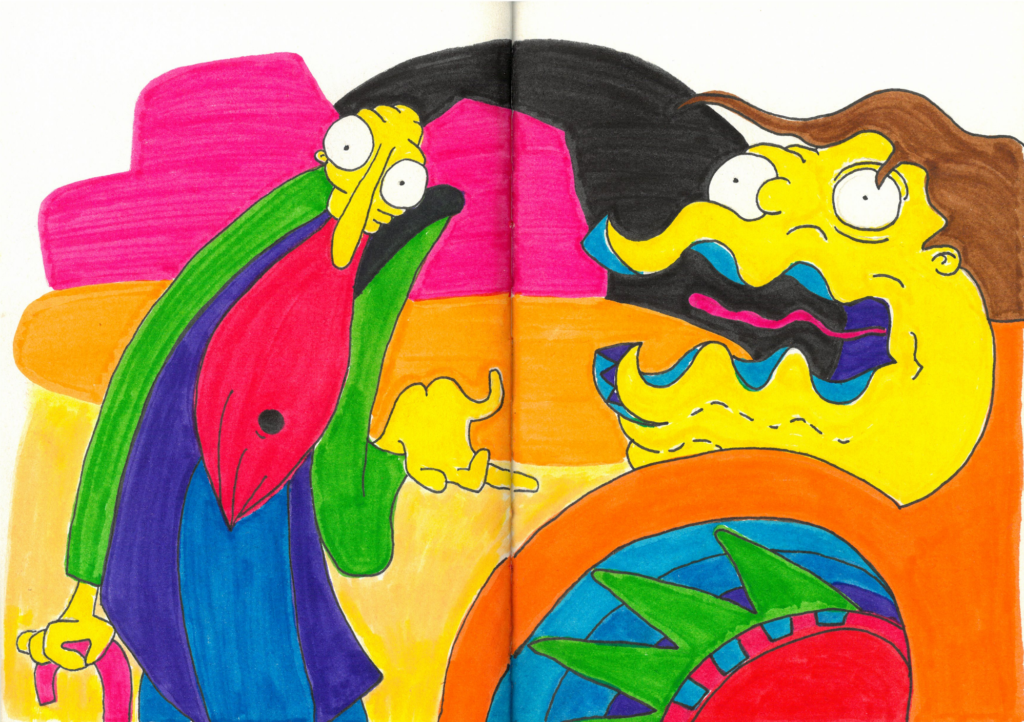
The Mysterious Voyage of Homer, 1997 is episode nine season eight of American animated series, The Simpsons. There is something special when a show deviates drastically from a well established style. This episode was certainly different, featuring surreal and psychedelic sequences which set it apart from any other episode in the series.
The episode features Homer attending a chili cook-off at the town’s local chili festival. A dedicated Homer is unable to stomach a spoon of Chief Wiggins extremely hot Guatemalan Insanity Peppers chili. In response to the burning sensation, Homer douses the internal flames with a beer. This upsets Homer’s wife Marge as she didn’t want Homer mixing alcohol with the chili; Marge leaves the festival due to her felt betrayal. Homer decides to stay and discovers he can ingest the peppers whilst coating his mouth in candle wax. Homer eats a number of the impossibly hot peppers before the peppers cause a sudden and extreme psychedelic effect. Homer hallucinates and runs alone into a surreal desert setting deep within his subconscious.
This sets up the key theme of the episode which questions what truly is a sou-mate? Homer often makes impulsive and dangerous decisions while Marge is responsible and caring. This creates doubts in his mind as to whether they are right for each other.
As Homer’s visual perception stabilizes a talking coyote appears, voiced by singer Johnny Cash. The coyote is presented as a spirit guide who challenges Homer’s preconceived notions of what a soul-mate truly is and helps him to confront his doubts surrounding his relationship with Marge. The next day a sober Homer searches for a soul-mate from the existing people in his life.
Finding only disappointment in his current circle, Homer sees a lighthouse in the distance during a lonely late night walk. Desperate, Homer decides the lighthouse keeper would surely be the cure to his loneliness. As he reaches the main console Homer realises there is in fact no-one who mans the building, it is automated. At this point a crazed Homer breaks the main light in a delusional rage believing that any boat which crashes will surely contain the cure to his isolation.
It is at this point we see Marge find Homer due to her intimate knowledge of her husband. Helping him repair the lighthouse. In this moment Homer understands that all the differences the two have ultimately make their relationship special.
While the lighthouse is repaired in time to stop a catastrophic shipwreck, there is some cargo containing short-shorts which is spilled to the delight of all the Springfield residents. All of Springfield is now dancing in their haul while Marge and Homer embrace in resolution knowing they are true soul-mates. The audience is left with a new understanding that we all, indeed, like short shorts.
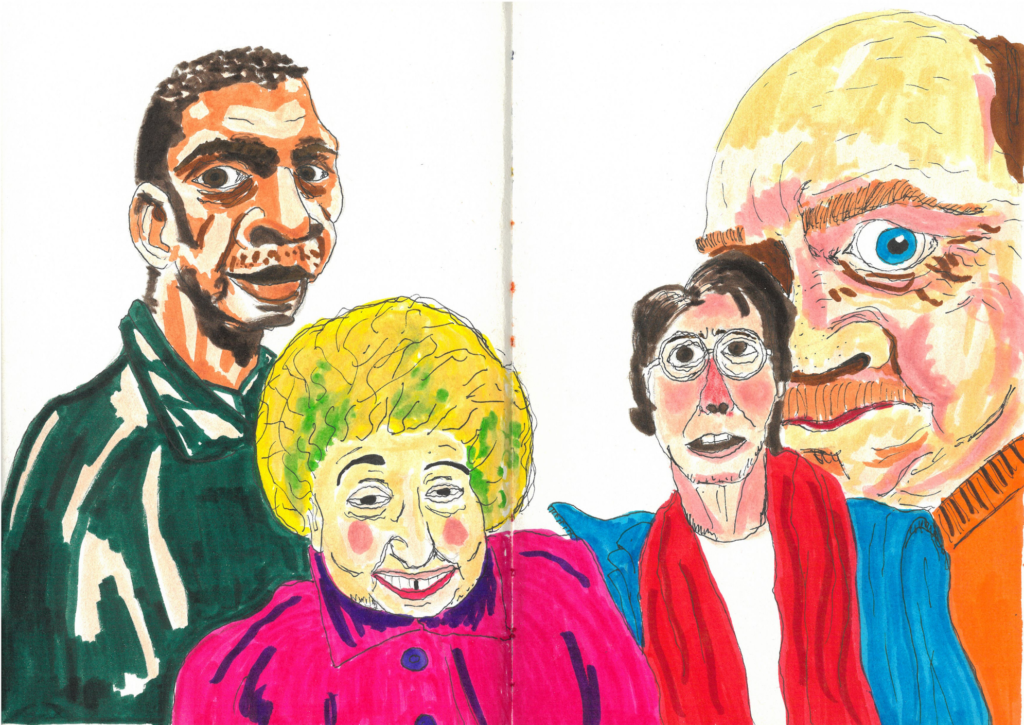
Lift is a documentary film released in 2001, directed by Marc Isaacs. The short documentary is Isaacs’ first film. It chronicles the residents of a single high rise apartment in London. The concept of the film is simple; Isaacs would station himself and his camera in the elevator, observe and document the different characters filtering through.
Understandably at the beginning, the various residents of the apartment are generally reserved, defensive and suspicious of Isaacs. Isaacs would spend the next two weeks filming for eight hours a day while progressively building rapport with the building’s residents solely confined in the elevator.
The confined setting creates a unique and intimate atmosphere as the many inhabitants slowly begin to communicate with Isaacs and each other. Stories begin to build as the audience learns more with each elevator ride. The residents increasingly share more of their thoughts and emotions with only minimal prompts from Isaacs. In addition The residents also find themselves increasingly interacting more with one another.
With its authentic portrayal of everyday people in a typical apartment in London, Lift creates an interesting commentary on the lack of community in the modern world. Here you have humans living like ants in large numbers and in close quarters yet they barely speak to each other let alone know one another.
Do you know your neighbours? If you do, you are either not living in a city or in a small minority. You can watch the 25 minute lift for free on YouTube!

‘Waking Life’ is an animated philosophical drama film released in 2001, directed by Richard Linklater. The movie follows a young man who finds himself in a series of surreal and philosophical encounters while trapped in a dream-state. As he navigates through these experiences, he meets various characters who engage him in discussions about the nature of reality, consciousness, dreams, free will, and the meaning of life.
The film is notable for its unique animation style, called ‘rotoscoping,’ where live action footage is traced over frame by frame to create a surreal and visually captivating effect. This technique contributes to the dream-like atmosphere of the film, creating a liminal effect throughout the film.
The series of vignettes featuring both real and fictional characters are fast paced. The first of which features Timothy ‘Speed’ Levitch. Levitch born 1970, is a tour guide, poet, and public speaker known for an eccentric speaking style. Levitch’s unconventional approach to tour guiding in New York City featured poetic and philosophical musings. It garnered him a dedicated following which eventually led to a documentary feature in ‘The Cruise’.
Levitch is able to effectively deliver a dense, yet accessible three minute monologue The seasoned tour guide is able to effortlessly reference Lorca, Dostoevsky, Mann, Giacometti and Lorca again. Levitch challenges the viewer to consider such questions as whether life is a dream and if we can both live life and understand it simultaneously.
“On really romantic evenings of self, I go salsa dancing with my confusion” Timothy ‘Speed’ Levitch, 2001.
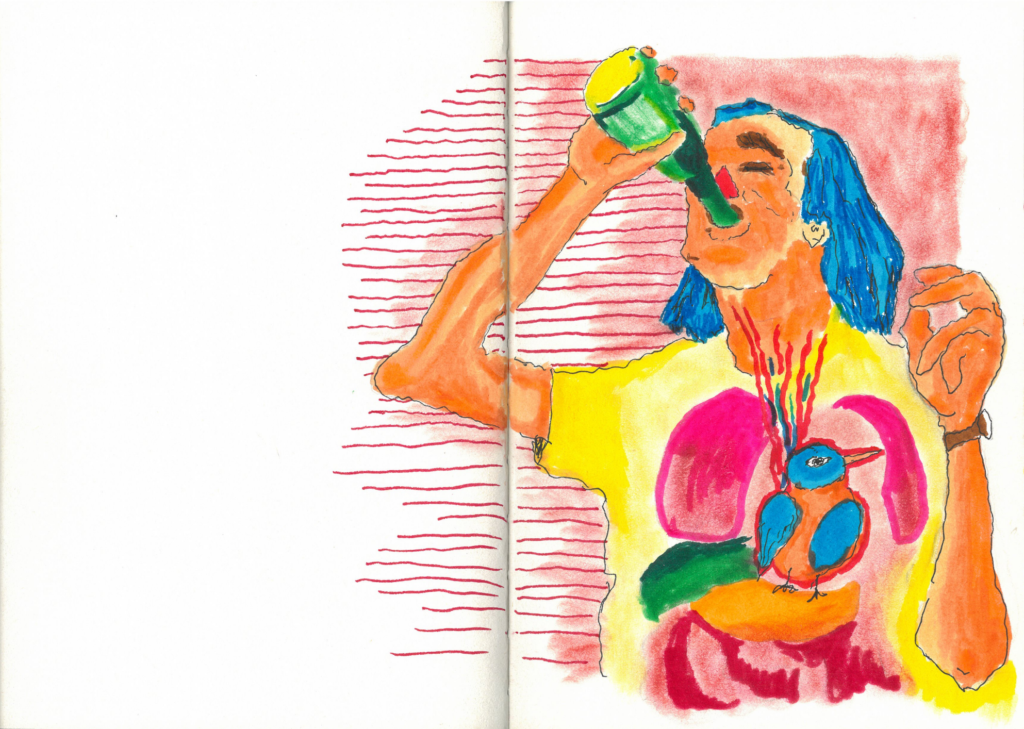
Charles Bukowski born 1920, was an American writer and poet best known for his raw and unapologetic works such as ‘Post Office’ and ‘Ham on Rye’. Exploring the dark realities of those disenfranchised in society, Bukowski would become one of America’s most important literary figures of the 20th century.
Bukowski’s writing would appeal to the everyman as he refused to over-intellectualise, instead he focused on gritty realism. Semi autobiographical, his work often delved into themes of poverty, relationships, alcoholism and the absurdity of modern life. These themes made all the more richer as Bukowski would marinade his ideas; writing all the while but it wasn’t until the age of 49 when he was finally able to become a full time writer.
Prior to his breakthrough Bukowski worked at the American Post office for 11 years. This was a notoriously difficult job. Most may not remember the colloquial term in the 80s-90s; ‘Going Postal’; referring to uncontrolled rage and violence in a workplace setting. This was coined after a spate of workplace violence most notably in 1986, a former employee of a Oklahoma branch shot and killed 14 people and ultimately killing himself.
Bukowski later remarked that if he had to work much longer at the post office that he would have killed himself. For the writer, the post office was a pimple on the ugly face of the modern world, the puss of which contained everything he hated; monotony, boredom, authority and alienation.
Bukowski is the antithesis of western culture and used his disdain to fuel his writing. A culture where we are told to always be positive, enjoy our work, exercise and if we drink, to do so in moderation. Bukowski hated this culture and ultimately lived life opposing many of the principles stated above.
If you are in a place where you hate everyone and everything; Bukowski is waiting for you at rock bottom. He’ll show you that you’re not alone in this state, in fact he’s willing to follow you further down. But when you’re ready, he’ll prop you up just enough for you to start climbing out by yourself.
Soulr did a great job with this documentary and serves as a great intro for the author. The following is a poem by Bukowski:
There’s a bluebird in my heart that
Wants to get out but I’m too tough for him
I say, stay in there, I’m not going
To let anybody see you
There’s a bluebird in my heart that
Wants to get out
But I pour whiskey on him and inhale
Cigarette smoke
And the whores and the bartenders
And the grocery clerks never know that
He’s in there
There’s a bluebird in my heart that
Wants to get out but I’m too tough for him
I say, Stay down, do you want to mess
Me up? You want to screw up the
Works? You want to blow my book sales in
Europe? There’s a bluebird in my heart that
Wants to get out
But I’m too clever, I only let him out
At night sometimes when everybody’s asleep
I say, I know that you’re there
So don’t be sad
Then I put him back
But he’s singing a little
In there, I haven’t quite let him die
And we sleep together like that
With our secret pact
And it’s nice enough to make a man
Weep, but I don’t weep, do
You?
– Charles Bukowski, 1972
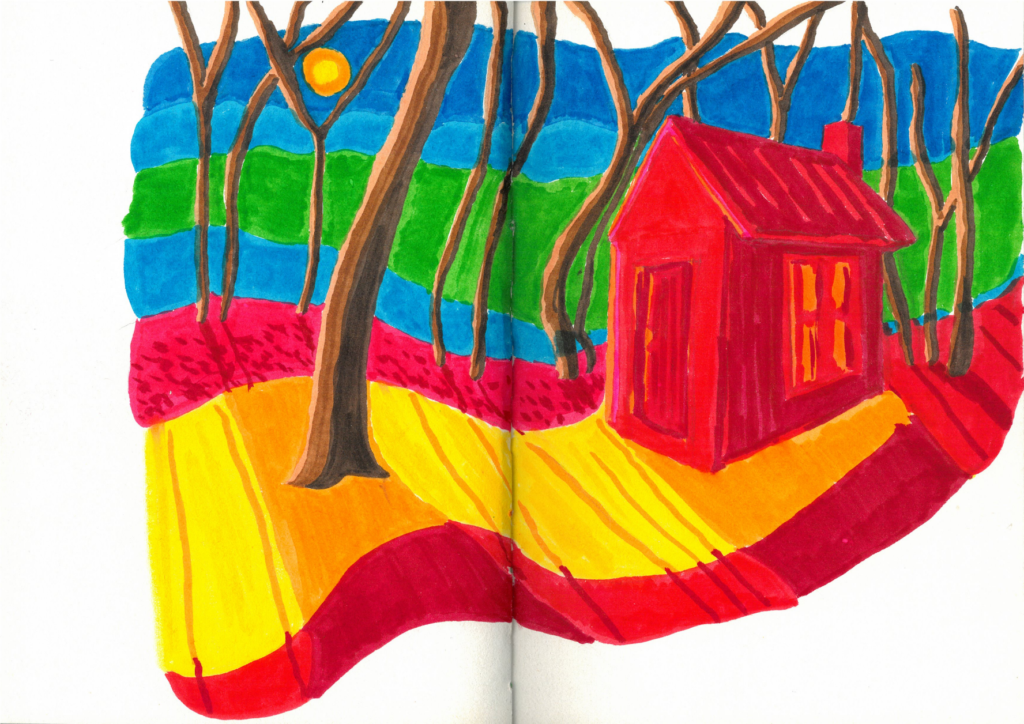
Henry David Thoreau born July 12 1817, was an American writer, philosopher and naturalist, best known for his works ‘Walden’ and ‘Civil Disobedience’. Thoreau was a leading figure of the Transcendentalist movement which emphasised the importance of individualism, self reliance and the connection between nature and the human spirit.
Over time the Transcendentalists would have a strong impact on the American psyche; influencing writers such as Henry Miller, the Beat Generation and the Hippies. The group itself explored ideas found in German Romanticism, British Romanticism and Eastern Philosophy.
‘Walden’ reflects Thoreau’s two years spent living semi isolated in Walden pond. Thoreau built a humble cabin on the property owned by his mentor Ralph Waldo Emerson, the materials of which would cost less than $1,000 accounting for inflation. Thoreau would spend the next two years documenting his time, thoughts and ideas living a semi isolated, self subsistent and minimalist lifestyle.
“I went to the woods because I wished to live deliberately, to front only the essential facts of life, and see if I could not learn what it had to teach, and not, when I came to die, discover that I had not lived. I did not wish to live what was not life, living is so dear; nor did I wish to practise resignation, unless it was quite necessary. I wanted to live deep and suck out all the marrow of life, to live so sturdily and Spartan-like as to put to rout all that was not life, to cut a broad swath and shave close, to drive life into a corner, and reduce it to its lowest terms…” -Thoreau, 1854
This quote is why I found Walden so valuable. Who in the modern world hasn’t had a feeling that the riptide of modern culture has not washed them out so far, they can no longer find shore. So many of us live lives of inertia greased up by the spirit of modern life. When you feel like you have taken one too many wrong turns and only realised you are lost now deep in the woods, the only sensible thing to do is build a cabin. Only very few have the luxury to live in a cabin for two years in order to assess their life path, although ‘Walden’ teaches us that we can find our equivalent. It is up to us to figure out what this may look like; a change in career or extended travel perhaps? At the very least ‘Walden’ consoles us that we are not alone in this sentiment.
Thoreau’s writing can feel tedious and preachy at times but ‘Walden’ contains nuggets of gold for those willing to sift through tough soil.. Some of his philosophical musings written in the 1800s feel more relevant today than ever. This book is a powerful criticism of modern society’s addiction to material goods which require more and more work to acquire, leading to a lack of time for one’s own pursuits.
‘Walden’ challenges the reader to assess one’s actions, their place in society and to live more deliberately in general. Ultimately if you read ‘Walden’ and feel you don’t learn much, it can feel comforting that a weirdo in the 1800s had similar conclusions to yourself.
“The mass of men lead lives of quiet desperation.” – Henry David Thoreau

Henry Miller was an American writer and artist born on December 26, 1891, in New York City. He is best known for his controversial and autobiographical novels “Tropic of Cancer” and “Tropic of Capricorn,” which gained him recognition and notoriety.
Miller is a fascinating character for a number of reasons. Learning that he quit his comfortable office job of eleven years at the age of 38 to pursue writing is what sparked my interest in his character. Take note that this all happened in 1930s America and Miller had no idea of how he was going to make money, let alone survive.
That same year he moved to Paris to pursue his passion where he lived hand to mouth until 1934. Miller in this period would be the quintessential starving artist. He would live off the kindness of friends, panhandle and only occasionally work as he was writing his debut masterpiece “Tropic of Cancer”.
I still can’t get past the fact that someone at that age would have the courage to leave everything behind, with no guarantee of success, everything stacked against them and moving to a foreign country with nothing. All of this well before the comforts afforded by the extensive information of the internet.
When reading Miller’s Tropic of Cancer I am left with an overwhelming sense of how happy and full of life Miller is in his circumstance. Paraphrasing a comment I’ve seen comparing Miller to Bukowski provides a good clue as to why Miller’s work is so special. ‘Miller is a lover of life, Bukowski endures life’. Having said this, ‘Tropic of Cancer’ is not a book for everyone. You will either love it or hate it. It was banned from sale in the United States for 27 years!
I certainly can’t see a book like this being published today with its copious amount of sexism. In addition parts of the book are absurdly degenerate but Miller’s writing is both technically brilliant and wildly honest in which lies its true charm.
Miller’s rebellious and nonconformist spirit made him a symbol of counterculture and individualism. His rejection of societal conventions and his embrace of personal freedom resonated with the Beat Generation and later countercultural movements. His work stands the test of time for the aforementioned reasons.
If you enjoy character studies I recommend Asleep and Awake; a 30 minute Documentary profiling Miller.
“I believe that today more than ever a book should be sought after even if it has only one great page in it. We must search for fragments, splinters, toenails, anything that has ore in it, anything that is capable of resuscitating the body and the soul.”
– Henry Miller, Tropic of Cancer





